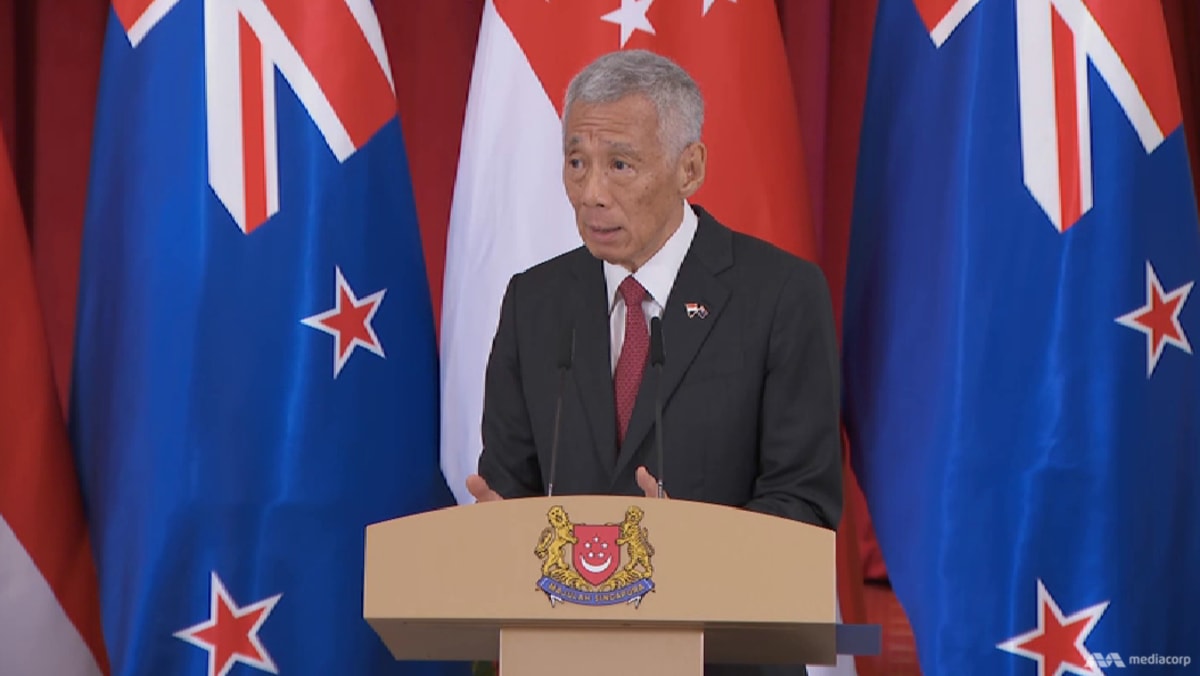
SINGAPORE: While nothing is going to solve the ongoing conflict in the Middle East within the foreseeable future, efforts should still be made towards achieving peace, said Prime Minister Lee Hsien Loong on Monday (Apr 15).
Small countries, like Singapore and New Zealand, have a role to play in developing a global consensus on the way forward, by clearly maintaining their stances and continuing to push for a rules-based global order, he said during a press conference with New Zealand PM Christopher Luxon.
Mr Luxon is on an official visit to Singapore until Tuesday, the first stop of his Southeast Asia trip.
In response to a question on whether the world is close to another World War and the role small countries can play amid heightened geopolitical tensions, Mr Lee said: “I do not think we are close to a world war; I think it is a very troubled world, and in particular, it’s a very troubled Middle East.”
REPERCUSSIONS AROUND THE WORLD
Over the weekend, Iran launched a direct attack on Israel for the first time, firing more than 300 missiles and drones. The attack caused only modest damage in Israel as most were shot down with the help of the United States, Britain and Jordan.
“The war in Gaza continues to have repercussions more widely, particularly in the Middle East, but actually with impact on opinions and on politics in countries around the world. Certainly in Europe and America, and in this part of the world too,” said Mr Lee.
“People are seized with it. They are very upset by what's happening, they have very strong feelings about it.”
He said small countries have to stick to their stances, and clearly explain their attitudes towards what is considered right or wrong, in order to contribute towards “developing a global consensus on the direction to go”.
“We cannot solve the problems in the Middle East. Nothing is going to solve the problems in the Middle East within the foreseeable future,” he said.
However, efforts can still be made to manage the situation by calming things down and trying to bring people back towards talking about peace, said Mr Lee.
That is going to be very hard, given the events of Oct 7 and what has happened since then, he noted.
“But if you don't try to do that, then you are saying the only way is the way of the sword, and I think that is going to lead to calamity for everybody,” said Mr Lee.
“So if you do not want calamity for your own people, then you have to make some very painful decisions. You need very strong and courageous leadership to guide your population forward to a less dangerous place.”
ROLE OF SMALL COUNTRIES
He added that small countries need to make their voices heard at international forums, such as regional ones like the Association of Southeast Asian Nations (ASEAN) and global ones like the United Nations (UN), when the matter is being debated or voted on.
It is especially crucial for small countries to do this because along with humanitarian considerations, their principles and vital national interests are at stake, said Mr Lee.
“Our vital national interest is an international order which is orderly, which has got a certain system in it, which enables countries big and small to live and coexist together; if possible, prosper together. And where there is a basis to decide things objectively and not just based on the law of the jungle and 'might is right',” he said.
In response to another question on the need for small countries to diversify their trading bases, Mr Lee said Singapore does business wherever the business is, and noted that “China is a very big market”.
At the same time, Singapore also seeks to enhance its cooperation and trade with other partners, he added.
“For this part of the world, I think that means having an open region — one with connections to America, to Europe, to India, to Australia and New Zealand. And to develop those ties so that you are able to cooperate omnidirectionally,” said Mr Lee.
“If there are ups and downs in one place, you cannot help being affected by them, but you may hopefully not be swamped by them.”
https://news.google.com/rss/articles/CBMingFodHRwczovL3d3dy5jaGFubmVsbmV3c2FzaWEuY29tL3NpbmdhcG9yZS9wcm9ibGVtcy1taWRkbGUtZWFzdC11bnNvbHZlYWJsZS13aXRoaW4tZm9yZXNlZWFibGUtZnV0dXJlLXBlYWNlLWVmZm9ydHMtbXVzdC1jb250aW51ZS1hdm9pZC1jYWxhbWl0eS1wbS1sZWUtNDI2NjA1NtIBAA?oc=5
2024-04-15 09:07:13Z
CBMingFodHRwczovL3d3dy5jaGFubmVsbmV3c2FzaWEuY29tL3NpbmdhcG9yZS9wcm9ibGVtcy1taWRkbGUtZWFzdC11bnNvbHZlYWJsZS13aXRoaW4tZm9yZXNlZWFibGUtZnV0dXJlLXBlYWNlLWVmZm9ydHMtbXVzdC1jb250aW51ZS1hdm9pZC1jYWxhbWl0eS1wbS1sZWUtNDI2NjA1NtIBAA
Tidak ada komentar:
Posting Komentar